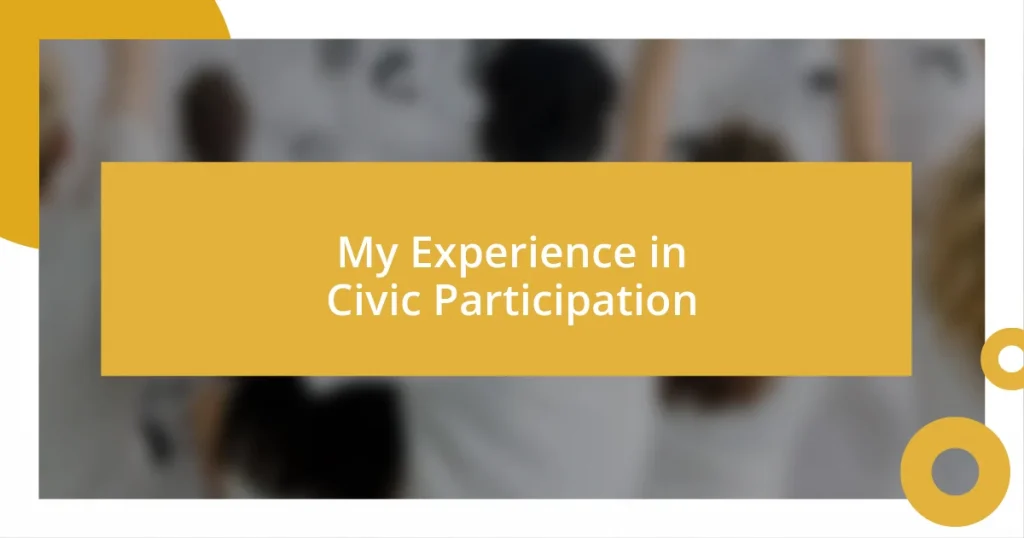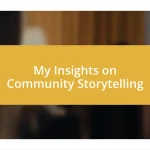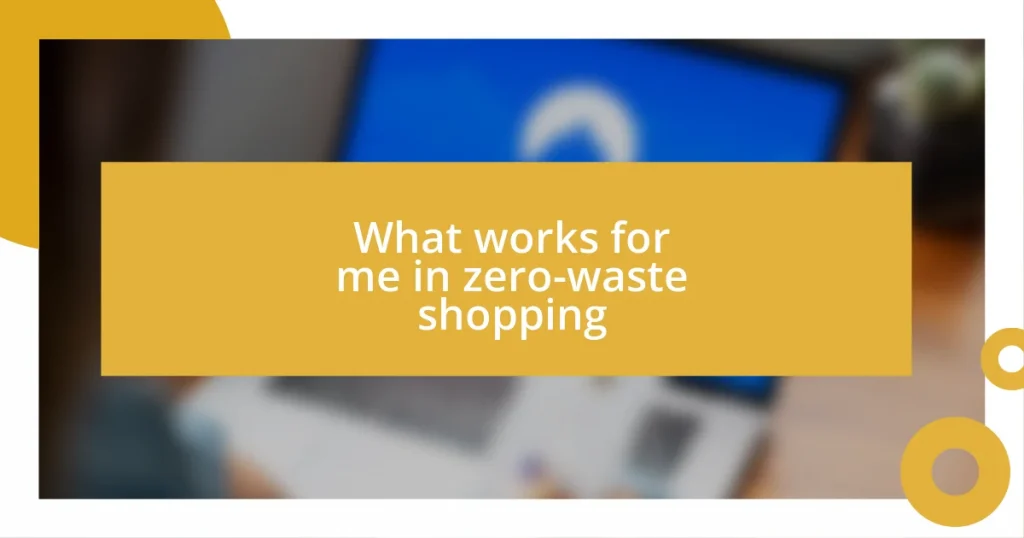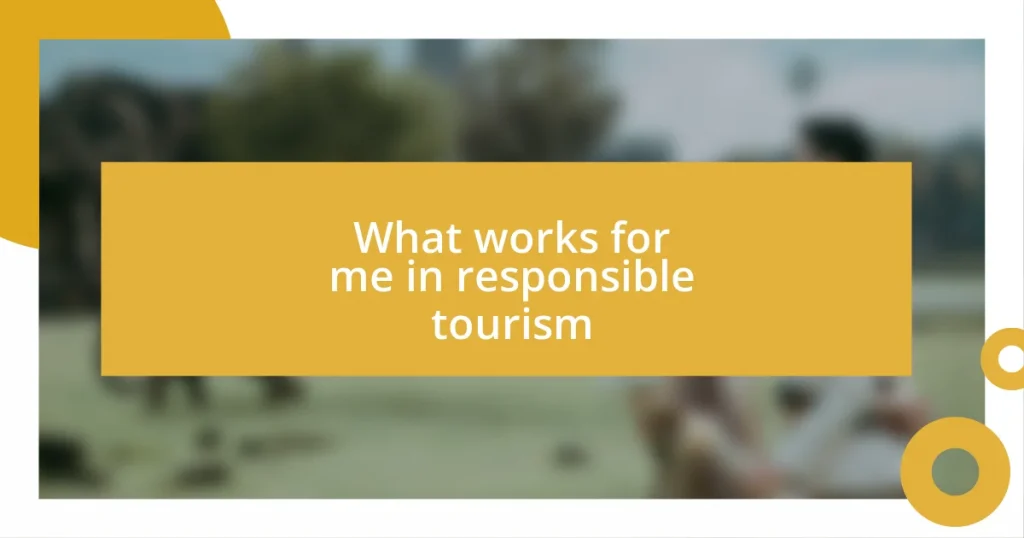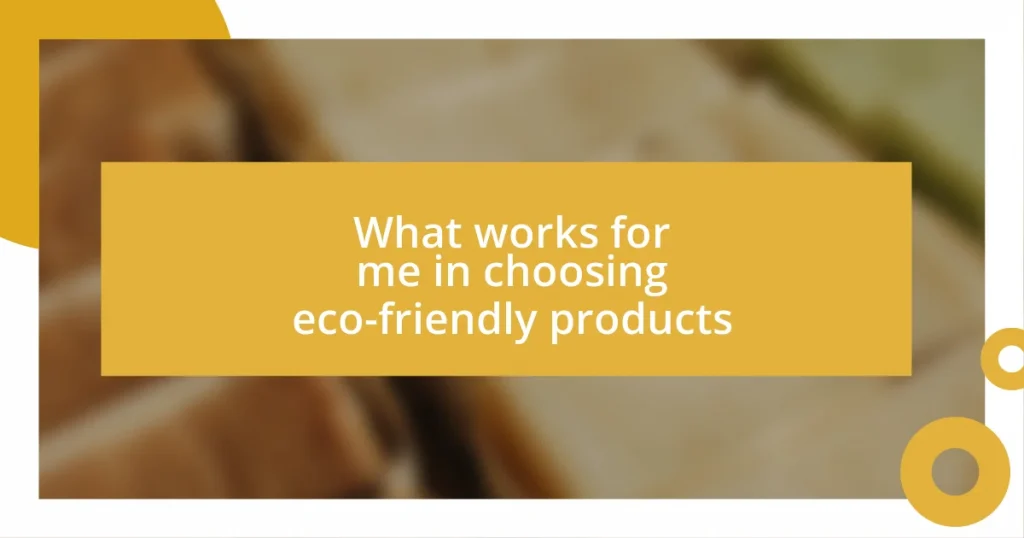Key takeaways:
- Civic participation fosters community connections and can empower individuals to feel a sense of belonging and agency.
- Engagement in civic activities enhances personal satisfaction while building friendships, advocating for causes, and influencing local decisions.
- Overcoming challenges like complex processes and communication barriers is essential for effective civic engagement, requiring strategies such as collaboration and open dialogue.

Understanding Civic Participation
Civic participation is the act of individuals engaging in activities that influence decisions affecting their communities. I remember the first time I attended a town hall meeting; the air was thick with anticipation and hope. It dawned on me that each voice mattered—my voice mattered.
What often struck me was the realization that civic participation takes many forms, from voting to volunteering at local organizations. For instance, I volunteered at a community garden, where the collective effort transformed not just the landscape but fostered connections among neighbors. Isn’t it fascinating how such simple actions can weave together the fabric of a community?
I often wonder what inspires people to engage—or what holds them back. I’ve seen friends who feel overwhelmed by the complexities of local governance shy away from participating. Yet, my experience has shown me that even small acts of engagement can spark a sense of belonging and empower others to contribute, creating a ripple effect that strengthens our communities.

Benefits of Civic Engagement
Civic engagement offers a myriad of benefits that extend beyond personal satisfaction. When I first contributed to a local charity event, I was astounded by how many people rallied together for a common cause. The connections I forged that day transformed acquaintances into friendships, showcasing how civic participation strengthens social networks.
I’ve also seen firsthand how engaging in community service can enhance one’s sense of purpose. Volunteering at a food bank ignited a passion within me to advocate for food security, showing me that involvement could lead to deeper advocacy. It was empowering to know that my actions were not just making a difference in others’ lives but also carving my own path toward meaningful engagement.
Moreover, civic engagement promotes a sense of agency and influence in one’s community. I recall attending a neighborhood discussion where residents proposed the renovation of a local park. The collective decision-making process instilled a powerful belief that, together, we could shape our environment. By participating, I learned that every idea contributes to the greater good, making civic engagement a vital part of personal and communal growth.
| Benefits of Civic Engagement | Examples |
|---|---|
| Strengthening Social Bonds | Building friendships through volunteering. |
| Fostering Advocacy | Transforming personal passions into community causes. |
| Creating a Sense of Agency | Participating in local decision-making processes. |

Challenges Faced During Participation
Participating in civic activities isn’t without its hurdles. I’ve faced moments of frustration when trying to navigate complex bureaucracies. For instance, the first time I tried to volunteer for a local initiative, I found the application process daunting and filled with jargon that seemed designed to confuse. It made me realize that many passionate people might get discouraged before they even start, and I understand how that can lead to a sense of exclusion from important community discussions.
Here are some common challenges that can arise during civic participation:
- Complexity of Processes: Many local governance processes can be overwhelming, filled with legal terms and procedures.
- Time Constraints: Balancing civic duties with personal commitments can be tough.
- Feeling Ill-Equipped: It’s easy to doubt your knowledge or skills compared to more experienced participants.
- Communication Barriers: Language differences or lack of access to information can hinder engagement.
- Resistance to Change: Sometimes, the existing structures may push back against new ideas, making it hard to feel heard.
Through my experiences, I’ve noticed that these obstacles often stem from a lack of clear communication and support. For example, when I attended a community meeting focused on development projects, I felt lost amidst discussions filled with technical terms that were foreign to me. Yet, it also sparked a motivation in me to seek clarity. I learned the importance of asking questions and advocating for inclusive dialogue, which can open doors for others who may feel similarly.

Strategies for Effective Engagement
Effective engagement in civic participation starts with understanding your strengths and interests. I remember when I first engaged in a community clean-up event. Initially, I was uncertain about what I could contribute. However, as I leaned into my passion for environmental advocacy, I discovered that my enthusiasm inspired others. This taught me that choosing a cause that resonates personally not only fuels our motivation but also helps to rally like-minded individuals around a shared vision.
Another strategy is to build partnerships with existing organizations. When I teamed up with a local nonprofit focused on youth mentoring, I found that the collective experience and resources made the efforts more impactful. It was an eye-opening moment to realize how collaboration can amplify our voices. Have you ever considered how your individual impact could grow by joining forces with others? I’ve experienced firsthand the magic of synergy—together, we can achieve far more than we could ever do alone.
Lastly, open communication is essential for effective engagement. At a community forum I attended, many voices were discouraged by previous experiences of being unheard. I spoke up to advocate for regular feedback loops, so everyone could share their opinions and insights. It really struck me how vital it is for participants to feel valued. Creating an inclusive space where diverse perspectives are acknowledged can transform participation into a dynamic dialogue, empowering each participant to actively contribute.

Impact on Community Development
Engaging in civic activities has a remarkable influence on community development, as I’ve observed in various settings. For example, during a neighborhood revitalization project, I witnessed firsthand how mobilizing a group of residents can breathe new life into public spaces. It wasn’t merely about beautifying the area; it fostered relationships among neighbors, creating a shared sense of responsibility for our community. Have you ever felt that sense of belonging when working together toward a common goal? For me, it was profound and deeply fulfilling.
I’ve also noticed that civic participation encourages innovative solutions to local challenges. One time, I joined a discussion panel focused on affordable housing. The diverse perspectives shared from different participants—the young couple struggling to find a home, the local business owner hoping to attract workforce housing—highlighted the need for multifaceted approaches. This collective brainstorming reminded me that when people come together, we can craft solutions that truly reflect the community’s needs. It’s incredible how collaboration can unlock creativity that might otherwise remain hidden!
Lastly, I remember participating in a community health fair that combined wellness initiatives with local services. It wasn’t just about informing residents; it was about building a supportive network. The connections formed that day led to ongoing health workshops and advocacy efforts, showcasing the power of sustained engagement. Watching individuals transform into proactive community advocates filled me with hope. It made me realize that these moments of collective participation not only strengthen our neighborhoods but also empower individuals to take charge of their own well-being. How rewarding is it to be part of something that leaves a lasting impact?

Encouraging Others to Participate
Encouraging others to participate in civic activities often starts with sharing our own experiences. I vividly recall inviting a close friend to join me at a town hall meeting on public safety. Initially hesitant, she found herself engaged by hearing our neighbors’ stories and concerns. It reminded me how relatable narratives can break down barriers, making civic involvement feel accessible and appealing. Have you ever noticed how a simple personal invitation can ignite someone’s curiosity to get involved?
Another impactful method I’ve found is to create opportunities for small steps. I once organized a weekend volunteer session at a local food bank. By framing it as a casual outing rather than a daunting commitment, several friends joined and were pleasantly surprised by how fulfilling it felt. This experience taught me that starting small can lead to larger commitments down the line. Isn’t it fascinating how a single experience can transform one’s perspective on participation?
Lastly, celebrating collective achievements can spark further involvement. When our community garden project flourished, we hosted a potluck to celebrate our hard work. The joy and pride shared on that day were palpable! By highlighting what we had accomplished together, I saw new faces emerge, eager to be part of something bigger. It truly hit home for me that recognition fuels enthusiasm—how often do we overlook this vital element in encouraging participation?










